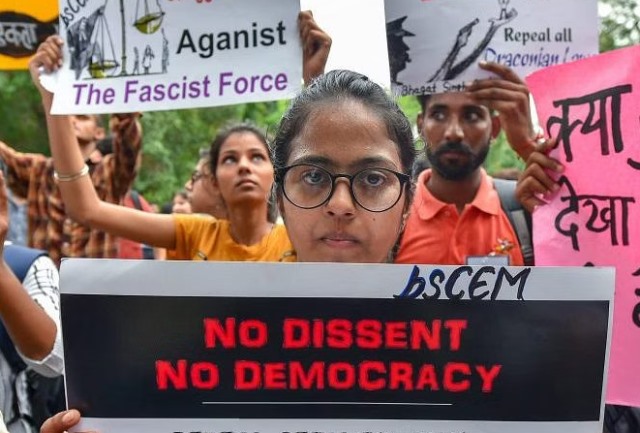Aggrieved by the growing intolerance in the country, some writers and artists in the country announced in 2015 to return the honors given by the Sahitya Akademi. These authors, a total of 39, had expressed their displeasure by returning the honor as we were hurt by the killing of writers like Kalburgi, Govind Pansare, Narendra Dabholkar and saddened that Sahitya Akademi is not taking any role in this regard as to why an institution like Sahitya Akademi does not care about the intolerance spread in the country and society. Supporters of the government tried to discredit their unique movement in independent India by calling it a ‘fake protest’ against the government. The supporters of the government dubbed the writers who returned the awards to the artist the ‘Purskar wapsi gang’ and this is often repeated today.
Although attempts have been made to trivialize the return of awards as an act of anti-nationalism, one wonders what the fact that the government is ready to frame new rules on government awards and honors even after eight years shows. Due to this incident, the entire system was shaken somewhere inside. Parliament’s Committee on Transport, Tourism, and Culture has suggested to the government that such an act of returning honor should be considered an anti-national act. It is also said in this recommendation that an affidavit should be taken that they will never take any action to return the government award after receiving it. It is a coincidence that the country is currently going through a Manipur-like situation and the issue is being debated in Parliament and on the streets, so the suggestion regarding the action to return the award in this name is expected to be debated. Insulting government honors. This mindset of associating government honors with ‘patriots’ and ‘traitors’ is an affront to democratic values and people’s right to protest. This undemocratic act must be opposed.
The step taken by Gurudev Rabindranath Tagore in connection with the Jallianwala Bagh incident is before us as a vivid example. In 1919, the then Nobel laureate Kavindra Ravindra gave voice to the nation’s anger and pain by returning the title of ‘Sir’ given by the British government to protest the brutal massacre of British General Dyer in Jallianwala Bagh. While returning the degree, Gurudev had said, ‘Time has come that the medals of honor are bringing shame to us’, when Gurudev had made it clear that the British Government’s action at Jallianwala Bagh was a disgraceful incident to humanity, and the honor bestowed by the Government on such an incident was a disgrace. They consider it necessary to return. He had said, “Democracy and freedom of thought cannot survive if loyalty to the government is more important than the voice of reason.”
This explanation of India’s first Nobel laureate says a lot and reminds lot. Freedom of thought and expression is such a democratic value that to ignore it should be considered a complete denial of democracy. Government fulfills its duty by honoring writers and artists. It is the responsibility of the government or an institution like the Sahitya Akademi to glorify the talent of the country. The honor itself is being reduced by placing conditions on the honor medal or the amount of honor. Asking for a written guarantee from the person being honored that he will not return the honor for life is actually an insult to the honoree. It is the individual’s right to accept or reject the honor. It is equally wrong to think that returning honor is treason, as it is wrong to think that the government is doing a favor to someone by honoring him.
Intolerance is constantly increasing in our society today. This situation should be a matter of concern for both the rulers of the country and the leaders of the society. ‘Puraskar Wapsi’ was an expression of the nation’s sentiments against such intolerance. It is a crime to call those who do so a ‘gang’. It is true that only 39 people then announced to return the award, but it is also true that these 39 people fought for democratic values and rights. Our rulers should understand that opposing the government in a democratic system is not opposing the country.
Any step taken against the failure of the government to check the intolerance spreading in the country is not against the country but in the interest of the country. In a healthy democratic society and system, the right to dissent is a citizen’s weapon against all wrongs. Returning awards, and returning honors are examples of such differences. This example should be respected.
One hundred and four years ago, Rabindranath Tagore, while returning the title ‘Sir’, expressed his disagreement with the policies of the government in a letter written to the then Viceroy. Eight years ago, 39 producers in the country voiced such dissent by campaigning to return the award. This expression is part of our history today. This divisive step taken to protect democratic values is not a matter of shame, but a matter of pride. This right to dissent must be protected. Democratic values demand respect for dissent. It is to be expected that the country and society will not accept such an obligation as an oath to never return the honor.
The writer can be contacted at vikasmeshram04@gmail.com
